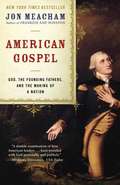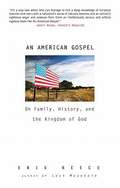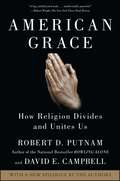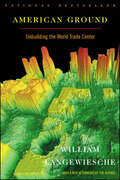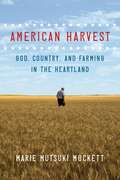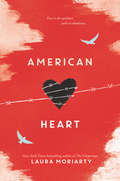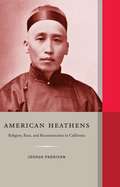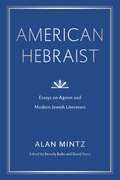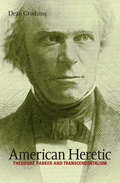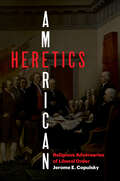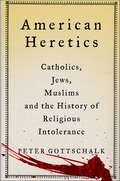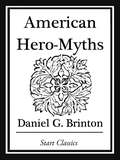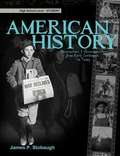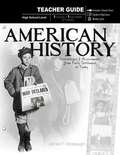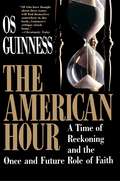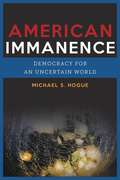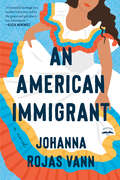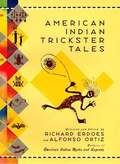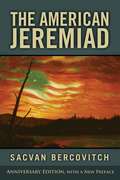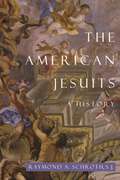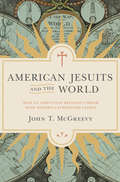- Table View
- List View
American Gospel: God, the Founding Fathers, and the Making of a Nation
by Jon MeachamThe American Gospel–literally, the good news about America–is that religion shapes our public life without controlling it. In this vivid book, New York Times bestselling author Jon Meacham tells the human story of how the Founding Fathers viewed faith, and how they ultimately created a nation in which belief in God is a matter of choice.At a time when our country seems divided by extremism, American Gospel draws on the past to offer a new perspective. Meacham re-creates the fascinating history of a nation grappling with religion and politics–from John Winthrop’s “city on a hill” sermon to Thomas Jefferson’s Declaration of Independence; from the Revolution to the Civil War; from a proposed nineteenth-century Christian Amendment to the Constitution to Martin Luther King, Jr.’s call for civil rights; from George Washington to Ronald Reagan.Debates about religion and politics are often more divisive than illuminating. Secularists point to a “wall of separation between church and state,” while many conservatives act as though the Founding Fathers were apostles in knee britches. As Meacham shows in this brisk narrative, neither extreme has it right. At the heart of the American experiment lies the God of what Benjamin Franklin called “public religion,” a God who invests all human beings with inalienable rights while protecting private religion from government interference. It is a great American balancing act, and it has served us well.Meacham has written and spoken extensively about religion and politics, and he brings historical authority and a sense of hope to the issue. American Gospel makes it compellingly clear that the nation’s best chance of summoning what Lincoln called “the better angels of our nature” lies in recovering the spirit and sense of the Founding. In looking back, we may find the light to lead us forward.
An American Gospel
by Erik ReeceFrom the award-winning author of Lost Mountain, a stirring work of memoir, spiritual journey, and historical inquiry. At the age of thirty-three, Erik Reece's father, a Baptist minister, took his own life, leaving Erik in the care of his grandmother and his grandfather-also a fundamentalist Baptist preacher, and a pillar of his rural Virginia community. While Erik grew up with a conflicted relationship with Christianity, he unexpectedly found comfort in the Jefferson Bible. Inspired by the text, he undertook what would become a spiritual and literary quest to identify an "American gospel" coursing through the work of both great and forgotten American geniuses, from William Byrd to Walt Whitman to William James to Lynn Margulis. The result of Reece's journey is a deeply intimate, stirring book about personal, political, and historical demons-and the geniuses we must call upon to combat them. .
American Government in Christian Perspective (2nd edition)
by William R. Bowen George T. Thompson Michael R. Lowman George C. CochranThe United States is just a little over 200 years old, a mere child in relation to the 6,000 years of recorded human history. Yet, in just two centuries, the United States has excelled the world's most ancient civilizations to become the greatest nation on earth.
American Government in Christian Perspective Third edition
by William R. Bowen George T. Thompson Michael R. Lowman George C. CochranChristian textbook
American Grace: How Religion Divides and Unites Us
by David E. Campbell Robert D. PutnamAmerican Grace is a major achievement, a groundbreaking examination of religion in America. Unique among nations, America is deeply religious, religiously diverse, and remarkably tolerant. But in recent decades the nation's religious landscape has been reshaped. America has experienced three seismic shocks, say Robert Putnam and David Campbell. In the 1960s, religious observance plummeted. Then in the 1970s and 1980s, a conservative reaction produced the rise of evangelicalism and the Religious Right. Since the 1990s, however, young people, turned off by that linkage between faith and conservative politics, have abandoned organized religion. The result has been a growing polarization--the ranks of religious conservatives and secular liberals have swelled, leaving a dwindling group of religious moderates in between. At the same time, personal interfaith ties are strengthening. Interfaith marriage has increased while religious identities have become more fluid. Putnam and Campbell show how this denser web of personal ties brings surprising interfaith tolerance, notwithstanding the so-called culture wars. American Grace is based on two of the most comprehensive surveys ever conducted on religion and public life in America. It includes a dozen in-depth profiles of diverse congregations across the country, which illuminate how the trends described by Putnam and Campbell affect the lives of real Americans. Nearly every chapter of American Grace contains a surprise about American religious life. Among them: * Between one-third and one-half of all American marriages are interfaith; * Roughly one-third of Americans have switched religions at some point in their lives; * Young people are more opposed to abortion than their parents but more accepting of gay marriage; * Even fervently religious Americans believe that people of other faiths can go to heaven; * Religious Americans are better neighbors than secular Americans: more generous with their time and treasure even for secular causes--but the explanation has less to do with faith than with their communities of faith; * Jews are the most broadly popular religious group in America today. American Grace promises to be the most important book in decades about American religious life and an essential book for understanding our nation today.
American Ground: Unbuilding the World Trade Center
by William LangewiescheSelected as one of the best books of 2002 by The New York Times, San Francisco Chronicle, Boston Globe, Los Angeles Times, and Chicago Sun-TimesWithin days after September 11, 2001, William Langewiesche had secured unique, unrestricted, round-the-clock access to the World Trade Center site. American Ground is a tour of this intense, ephemeral world and those who improvised the recovery effort day by day, and in the process reinvented themselves, discovering unknown strengths and weaknesses. In all of its aspects--emotionalism, impulsiveness, opportunism, territoriality, resourcefulness, and fundamental, cacophonous democracy--Langewiesche reveals the unbuilding to be uniquely American and oddly inspiring, a portrait of resilience and ingenuity in the face of disaster.
American Harvest: God, Country, and Farming in the Heartland
by Marie Mutsuki MockettAn epic story of the American wheat harvest, the politics of food, and the culture of the Great PlainsFor over one hundred years, the Mockett family has owned a seven-thousand-acre wheat farm in the panhandle of Nebraska, where Marie Mutsuki Mockett’s father was raised. Mockett, who grew up in bohemian Carmel, California, with her father and her Japanese mother, knew little about farming when she inherited this land. Her father had all but forsworn it.In American Harvest, Mockett accompanies a group of evangelical Christian wheat harvesters through the heartland at the invitation of Eric Wolgemuth, the conservative farmer who has cut her family’s fields for decades. As Mockett follows Wolgemuth’s crew on the trail of ripening wheat from Texas to Idaho, they contemplate what Wolgemuth refers to as “the divide,” inadvertently peeling back layers of the American story to expose its contradictions and unhealed wounds. She joins the crew in the fields, attends church, and struggles to adapt to the rhythms of rural life, all the while continually reminded of her own status as a person who signals “not white,” but who people she encounters can’t quite categorize.American Harvest is an extraordinary evocation of the land and a thoughtful exploration of ingrained beliefs, from evangelical skepticism of evolution to cosmopolitan assumptions about food production and farming. With exquisite lyricism and humanity, this astonishing book attempts to reconcile competing versions of our national story.
American Heart
by Laura MoriartyA powerful and thought-provoking YA debut from New York Times bestselling author Laura Moriarty.Imagine a United States in which registries and detainment camps for Muslim-Americans are a reality.Fifteen-year-old Sarah-Mary Williams of Hannibal, Missouri, lives in this world, and though she has strong opinions on almost everything, she isn’t concerned with the internments because she doesn’t know any Muslims. She assumes that everything she reads and sees in the news is true, and that these plans are better for everyone’s safety.But when she happens upon Sadaf, a Muslim fugitive determined to reach freedom in Canada, Sarah-Mary at first believes she must turn her in. But Sadaf challenges Sarah-Mary’s perceptions of right and wrong, and instead Sarah-Mary decides, with growing conviction, to do all she can to help Sadaf escape.The two set off on a desperate journey, hitchhiking through the heart of an America that is at times courageous and kind, but always full of tension and danger for anyone deemed suspicious.
American Heathens: Religion, Race and Reconstruction in California
by Joshua PaddisonIn the 19th-century debate over whether the United States should be an explicitly Christian nation, California emerged as a central battleground. Racial groups that were perceived as godless and uncivilized were excluded from suffrage, and evangelism among Indians and the Chinese was seen as a politically incendiary act. Joshua Paddison sheds light on Reconstruction’s impact on Indians and Asian Americans by illustrating how marginalized groups fought for a political voice, refuting racist assumptions with their lives, words, and faith. Reconstruction, he argues, was not merely a remaking of the South, but rather a multiracial and multiregional process of reimagining the nation.
American Hebraist: Essays on Agnon and Modern Jewish Literature (Dimyonot)
by Alan MintzAlan Mintz (1947–2017) was a singular figure in the American Jewish literary landscape. In addition to publishing six authoritative books and numerous journal articles on modern and contemporary Jewish culture, Mintz contributed countless reviews and essays to literary journals, including the New Republic, the New York Times Book Review, and the Jewish Review of Books. Scattered in miscellaneous volumes and publications, these writings reveal aspects of Mintz’s scholarly personality that are not evident in his monographs.American Hebraist collects fifteen of Mintz’s most insightful articles and essays. The topics range from the life and work of Nobel Prize winner S. Y. Agnon—including a chapter from Mintz’s unfinished literary biography of that author—to Jewish and Israeli literature, the Holocaust, and a rare autobiographical essay. The chapters are introduced and contextualized by Mintz’s longtime colleague and friend David Stern, who opens the book by tracing the arc of Mintz’s intellectual career; the volume concludes with a personal essay and remembrance written by Beverly Bailis, the last student to complete a doctorate under Mintz’s direction.Brimming with erudition and intriguing biographical notes, American Hebraist provides new insights into the life and work of one of the twentieth century’s most important scholars of modern Hebrew literature. Students and scholars alike will benefit from this essential companion to Mintz’s scholarship.
American Heretic
by Dean GrodzinsTheodore Parker (1810-1860) was a powerful preacher who rejected the authority of the Bible and of Jesus, a brilliant scholar who became a popular agitator for the abolition of slavery and for women's rights, and a political theorist who defined democracy as "government of all the people, by all the people, for all the people"--words that inspired Abraham Lincoln. Parker had more influence than anyone except Ralph Waldo Emerson in shaping Transcendentalism in America.In American Heretic, Dean Grodzins offers a compelling account of the remarkable first phase of Parker's career, when this complex man--charismatic yet awkward, brave yet insecure--rose from poverty and obscurity to fame and notoriety as a Transcendentalist prophet. Grodzins reveals hitherto hidden facets of Parker's life, including his love for a woman who was not his wife, and presents fresh perspectives on Transcendentalism. Grodzins explores Transcendentalism's religious roots, shows the profound religious and political issues at stake in the "Transcendentalist controversy," and offers new insights into Parker's Transcendentalist colleagues, including Emerson, Margaret Fuller, and Bronson Alcott. He traces, too, the intellectual origins of Parker's epochal definition of democracy as government of, by, and for the people.The manuscript of this book was awarded the Allan Nevins Prize by the Society of American Historians.
American Heretics: Religious Adversaries of Liberal Order
by Jerome E. CopulskyA penetrating account of the religious critics of American liberalism, pluralism, and democracy—from the Revolution until today &“A chilling consideration of persistent mutations of American thought still threatening our pluralist democracy.&”—Kirkus Reviews (starred review) The conversation about the proper role of religion in American public life often revolves around what kind of polity the Founders of the United States envisioned. Advocates of a &“Christian America&” claim that the Framers intended a nation whose political values and institutions were shaped by Christianity; secularists argue that they designed an enlightened republic where church and state were kept separate. Both sides appeal to the Founding to justify their beliefs about the kind of nation the United States was meant to be or should become. In this book, Jerome E. Copulsky complicates this ongoing public argument by examining a collection of thinkers who, on religious grounds, considered the nation&’s political ideas illegitimate, its institutions flawed, and its church‑state arrangement defective. Beholden to visions of cosmic order and social hierarchy, rejecting the increasing pluralism and secularism of American society, they predicted the collapse of an unrighteous nation and the emergence of a new Christian commonwealth in its stead. By engaging their challenges and interpreting their visions we can better appreciate the perennial temptations of religious illiberalism—as well as the virtues and fragilities of America&’s liberal democracy.
American Heretics: Catholics, Jews, Muslims and the History of Religious Intolerance
by Peter GottschalkIn the middle of the nineteenth century a group of political activists in New York City joined together to challenge a religious group they believed were hostile to the American values of liberty and freedom. Called the Know Nothings, they started riots during elections, tarred and feathered their political enemies, and barred men from employment based on their religion. The group that caused this uproar?: Irish and German Catholics—then known as the most villainous religious group in America, and widely believed to be loyal only to the Pope. It would take another hundred years before Catholics threw off these xenophobic accusations and joined the American mainstream. The idea that the United States is a stronghold of religious freedom is central to our identity as a nation—and utterly at odds with the historical record. In American Heretics, historian Peter Gottschalk traces the arc of American religious discrimination and shows that, far from the dominant protestant religions being kept in check by the separation between church and state, religious groups from Quakers to Judaism have been subjected to similar patterns of persecution. Today, many of these same religious groups that were once regarded as anti-thetical to American values are embraced as evidence of our strong religious heritage—giving hope to today's Muslims, Sikhs, and other religious groups now under fire.
American Hero-Myths
by Daniel G. BrintonThis little volume is a contribution to the comparative study of religions. It is an endeavor to present in a critically correct light some of the fundamental conceptions which are found in the native beliefs of the tribes of America.
American History-Student
by James P. StobaughRespected Christian educator, Dr. James Stobaugh, offers an entire year of high school American history curriculum in an easy to teach and comprehensive volume. American History: Observations & Assessments from Early Settlement to Today employs clear objectives and challenging assignments for the tenth grade student. From before the birth of our republic to the principles of liberty, American history trends, philosophies, and events are thoroughly explored. The following components are covered for the student: Critical thinking Examinations of historical theories, terms, and concepts History makers who changed the course of America Overviews and insights into world views. Students will complete this course knowing the Christian influences that created a beacon of hope and opportunity that still draws millions to the United States of America. This 384-page student resource should be used in conjunction with the American History: Observations & Assessments from Early Settlement to Today for the Teacher. British History and World History are included in this comprehensive high school history curriculum for 10th, 11th, and 12th grades offered by Dr. James Stobaugh and Master Books.
American History - Teacher Guide
by James P. StobaughThis convenient teacher's guide is all a parent or teacher needs to easily grade the 10th grade student assignments for American History: Observations & Assessments from Early Settlement to Today. Assignments with answers, learning objectives, grading criteria, and short essay questions are included. This course is designed for a student to practice independent learning. The guide will assist teachers by offering: 34 chapters for 34 weeks of study Chapters include 5 lessons taking approximately 30 minutes each The final lesson of the week is an exam covering the week's instruction Student questions are organized in the back for easy use in testing and review Teachers, parents, or students can grade assignments daily or weekly As the teacher, you will enjoy partnering with your student as he or she processes American history while developing or strengthening a Christian world view.
American Hour: A Time of Reckoning and the Once and Future Role of Faith
by Os Guinness"In "The American Hour", Guinness examines the growing crisis in America's moral and cultural order. In particular, he explores its impact on three areas which he considers vital to the health of America: on identity, as in the currently contested notion of what it means to be an American; on American public philosophy, including the now controversial relationship of religion and public life; and on American republican character, including the distinctive emphasis on the importance of the "habits of the heart". Guinness goes on to set forth a vision of a reforged public philosophy, one through which we can solve the practical questions of living with our deepest differences. He also sees the possibility of a new, vital and constructive role for religion in American public life.
American Immanence: Democracy for an Uncertain World (Insurrections: Critical Studies in Religion, Politics, and Culture)
by Michael S. HogueThe Anthropocene marks the age of significant human impact on the Earth’s ecosystems, dramatically underscoring the reality that human life is not separate from nature but an integral part of it. Culturally, ecologically, and socially destructive practices such as resource extraction have led to this moment of peril. These practices, however, implicate more than industrial and economic systems: they are built into the political theology of American exceptionalism, compelling us to reimagine human social and political life on Earth. American Immanence seeks to replace the dominant American political tradition, which has resulted in global social, economic, and environmental injustices, with a new form of political theology, its dominant feature a radical democratic politics. Michael S. Hogue explores the potential of a dissenting immanental tradition in American religion based on philosophical traditions of naturalism, process thought, and pragmatism. By integrating systems theory and concepts of vulnerability and resilience into the lineages of American immanence, he articulates a political theology committed to democracy as an emancipatory and equitable way of life. Rather than seeking to redeem or be redeemed, Hogue argues that the vulnerability of life in the Anthropocene calls us to build radically democratic communities of responsibility, resistance, and resilience. American Immanence integrates an immanental theology of, by, and for the planet with a radical democratic politics of, by, and for the people.
An American Immigrant: A Novel
by Johanna Rojas VannA Colombian American journalist tries to save her career by taking an assignment somewhere she never thought she&’d go—Colombia—in this heartwarming debut novel about rediscovering our family stories.&“A beautiful homage to a mother&’s bravery and to the grace and grit that is our inheritance.&”—Alicia Menendez, MSNBC anchor and creator and host of the Latina to Latina podcastTwenty-five-year-old Melanie Carvajal, a hardworking but struggling journalist for a Miami newspaper, loves her Colombian mother but regularly ignores her phone calls, frustrated that she never quite takes the time to understand Melanie&’s life. When the opportunity arises for a big assignment that might save her flagging career, Melanie follows the story to the land of her mother&’s birth. She soon realizes Colombia has the potential to connect her, after all these years, to something she&’s long ignored: her heritage, the love of her mother, her family, and the richest parts of herself. Colombia offers more than a chance to make a name for herself as a writer. It is a place of untold stories.Inspired by real-life events, An American Immigrant is a story of culture and community, of abiding commitment to family, and of embracing our culture and the generations that have come before.
American Indian / First Nations Schooling
by Charles L. GlennTracing the history of Native American schooling in North America, this book emphasizes factors in society at large - and sometimes within indigenous communities - which led to Native American children being separate from the white majority. Charles L. Glenn examines the evolving assumptions about race and culture as applied to schooling, the reactions of parents and tribal leadership in the United States and Canada, and the symbolic as well as practical role of indigenous languages and of efforts to maintain them.
American Indian Trickster Tales
by Richard Erdoes Alfonso Ortizit's the Trickster who provides the real spark in the action
The American Jeremiad
by Sacvan BercovitchWhen Sacvan Bercovitch'sThe American Jeremiadfirst appeared in 1978, it was hailed as a landmark study of dissent and cultural formation in America, from the Puritans' writings through the major literary works of the antebellum era. For this long-awaited anniversary edition, Bercovitch has written a deeply thoughtful and challenging new preface that reflects on his classic study of the role of the political sermon, or jeremiad, in America from a contemporary perspective, while assessing developments in the field of American studies and the culture at large.
The American Jesuits: A History
by Raymond A SchrothChoice Outstanding Academic Title for 2008A broad and compelling look at the impact of the largest Catholic order of men on American cultureWith infectious energy and a genuine gift for storytelling, Raymond A. Schroth recounts the history of Jesuits in the United States. The American Jesuits isn’t simply a book for Catholics; it’s for anyone who loves a well-told historical tale. For more than 450 years, Jesuit priests have traveled the globe out of a religious commitment to serve others. Their order, the Society of Jesus, is the largest religious order of men in the Catholic Church, with more than 20,000 members around the world and almost 3,000 in the United States. It is one of the more liberal orders in the Church, taking very public stands in the U.S. on behalf of social justice causes such as the promotion of immigrants’ rights and humanitarian aid, including assistance to Africa’s poor, and against American involvement in “unjust wars.” Jesuits have played an important part in Americanizing the Catholic Church and in preparing Catholic immigrants for inclusion into American society.Starting off with the first Jesuit to reach the New World—he was promptly murdered on the Florida coast—Schroth focuses on the key periods of the Jesuit experience in the Americas, beginning with the era of European explorers, many of whom were accompanied by Jesuits and some of whom were Jesuits themselves. Suppressed around the time of the American Revolution, the Society experienced resurgence in the nineteenth century, arriving in the U.S. along with waves of Catholic immigrants and establishing a network of high schools and universities. In the mid-twentieth century, the Society transformed itself to serve an urbanizing nation.Schroth is not blind to the Society’s shortcomings and not all of his story reflects well on the Jesuits. However, as he reminds readers, Jesuits are not gods and they don’t dwell in mountaintop monasteries. Rather, they are imperfect men who work in a messy world to “find God in all things” and to help their fellow men and women do the same.A quintessential American tale of men willing to take risks — for Indians, blacks, immigrants, and the poor, and to promote a loving picture of God—The American Jesuits offers a broad and compelling look at the impact of this 400-year-old international order on American culture and the culture’s impact on the Jesuits.
American Jesuits and the World: How an Embattled Religious Order Made Modern Catholicism Global
by John T. McgreevyAt the start of the nineteenth century, the Jesuits seemed fated for oblivion. Dissolved as a religious order in 1773 by one pope, they were restored in 1814 by another, but with only six hundred aged members. Yet a century later, the Jesuits numbered seventeen thousand men and were at the vanguard of the Catholic Church's expansion around the world. In the United States especially, foreign-born Jesuits built universities and schools, aided Catholic immigrants, and served as missionaries. This book traces this nineteenth-century resurgence, showing how Jesuits nurtured a Catholic modernity through a disciplined counterculture of parishes, schools, and associations.Drawing on archival materials from three continents, American Jesuits and the World tracks Jesuits who left Europe for America and Jesuits who left the United States for missionary ventures across the Pacific. Each chapter tells the story of a revealing or controversial event, including the tarring and feathering of an exiled Swiss Jesuit in Maine, the efforts of French Jesuits in Louisiana to obtain Vatican approval of a miraculous healing, and the educational efforts of American Jesuits in Manila. These stories place the Jesuits at the center of the worldwide clash between Catholics and liberal nationalists, and reveal how the Jesuits not only revived their own order but made modern Catholicism more global.The result is a major contribution to modern global history and an invaluable examination of the meaning of religious liberty in a pluralistic age.
American Jesus: How the Son of God Became a National Icon
by Stephen ProtheroThe many guises in which Jesus has been represented.
